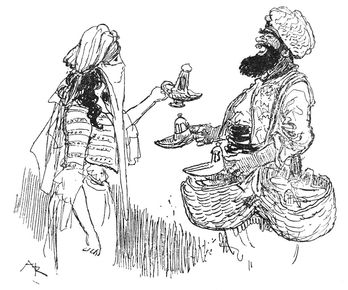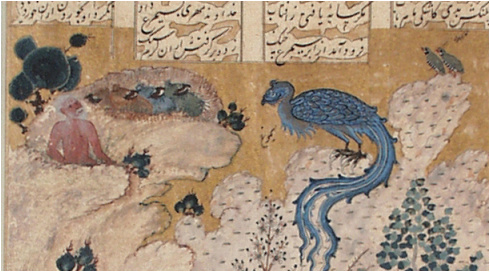|
I have an old copy of the Arabian Nights written for children, and I read it a few times. I always loved the one with Periezade best. (She's so cool!) However, some stories left me with questions. There is one line in the story of Aladdin that has always mystified me. So, the original story is much longer and more complicated than the Disney version. It even takes place in China! Well, sort of. It's called China but none of the names or settings seem particularly Chinese. It reads more like a name tacked on to say "oh, this story took place far away." Aladdin is not one of the original Thousand and One Nights, but a story added in the 18th century by French translator Antoine Galland. He claimed to have heard it himself from a monk from Aleppo. There are two genies. And there are two villains - the sorcerer who's after the lamp in the first place, and then his brother, who comes in to avenge him. The brother is legitimately terrifying. He kills an old lady, dresses up as her, and gains the princess's confidence, filling her with greed for . . . the egg of a roc, so that she can hang it up in her house, as you do. Just as planned, the princess asks Aladdin for one, and he promises to wish one up for her. Here's where things take an unusual turn - for the first time, the genie refuses a wish. Not just refuses, but screams in Aladdin's face.
Where did this come from? I thought rocs were just giant birds that threw rocks at Sinbad. Now the roc's egg is the genie's master? Even holding the lamp, we learn, does not make Aladdin the true master of the genie. There is a higher, sacred authority. So, in the story of Aladdin, the genie's master is apparently a roc's egg. This is something that sorcerers know, but ordinary citizens are ignorant of. One thing that muddles this for me is that Aladdin was likely, at least in part, invented by Galland. So there's a chance he made up that exchange with the genie and had no idea what he was talking about. However, after a little bit of thought, I think there is a logical rationale behind it. The reason goes back to the simurgh. There are giant birds like the roc in many mythologies. One tale of the Arabian Nights, "The Story of Damir and al-‘Anqa,’" features a female djinn named Al-Anqa - that being the name of another Arabic monster-bird, the anqa or anka. The phoenix, a symbol of rebirth, also routinely shows up in these lists, along with the Egyptian bennu, the Jewish ziz, and the Greek gryphon.
The Persian equivalent is the simurgh, which like the roc is described as big enough to carry off elephants. Iranian legends say that the bird is so old that it has seen the world destroyed three times over, and is nearly all-knowing. In some stories, like the Phoenix, it plunges itself voluntarily into flames. The simurgh is a being of healing and purity which purifies things, bestows fertility, in one story taught humans to do Cesarean sections, and represents the union between the Earth and sky. It nests in the Tre of Life, the source of all kinds of plants and healing medicine. A similar bird, the Hōm, is a healer and messenger which represents the divine right of kings. In Sufi mysticism, the Simurgh would later become a metaphor for God; it was the king of the birds in the 12th-century work "The Conference of the Birds." In the Arabic-speaking world, the Simurgh was combined with other birds of myth like the Ghoghnus, and became the Roc or Rukh. Like the Simurgh, the Roc is a huge bird big enough to carry off elephants. Eating the fertilized egg of a Roc was said to grant eternal youth - hearkening back to the Simurgh's powers of healing and life. (Sinbad's companions try to eat a Roc's egg in one story.) So here you have a birdlike creature that heals and purifies; its flesh grants eternal youth; it connects Earth and Sky and has been used as a metaphor for God and royalty. Eggs themselves are symbols of new life. Djinn are mysterious creatures of flame, more akin to angels and demons than to humans. Many seem to have powers beyond human comprehension. They may be evil or good, but fall under the dominion of Allah. Many served King Solomon. The name of the female genie Al-Anqa suggest a further connection between djinn and large birds. In Muruj al-dhahab, by Al-Mas'udi (c. 896–956), the first iblises, marids and ghouls are all described as hatching from eggs laid by a jann lady - these all being different types of djinn. Some writers have taken notice of this scene. One source, somewhat fancifully, describes an embryonic Roc as the "Prince of Djins." Another talks about a Voldemort-style "Lord of the Lamp" that has enslaved these genies. I don't know where the author got that interpretation from. Others have the roc's egg described in feminine terms, as the genie's "Liege Lady" or "mistress." However, I haven't been able to find any real in-depth discourse or adaptations. SOURCES
Text copyright © Writing in Margins, All Rights Reserved
10 Comments
Julia
10/3/2016 07:56:47 pm
Great post, well researched as usual, I certainly learned something new today! I read the complete Aladdin story once or twice, but the details escape me, in the kiddie book version from my childhood the egg was the *property* of the genies master, not the masrer itself.
Reply
Ooh, the egg being the master's property is one I hadn't heard of.
Reply
Julia
10/4/2016 07:11:17 pm
Oh, I know that story, but I didn'tember her name. It's a good one :)
Sarah
10/7/2016 05:37:02 pm
Thank you for commenting!
Reply
Sis
5/5/2017 03:11:44 am
Hi Sarah,
Reply
Sarah
5/5/2017 06:53:09 am
Ah, thanks for the feedback! This really makes the pieces click together for me. I will have to check out that book!
Reply
Tiffany
2/22/2020 03:41:31 am
Well, now! All hail the roc and her sacred egg. I'm so glad to have found this post. This question has burned in me for so many years. Though I've looked I never ran across this post until now and it has really helped me out the pieces together as well.
Reply
shyambition
10/8/2021 01:07:44 am
Thank you so much I am doing research for my comic book and this is a wealth of knowledge.
Reply
CJ
8/20/2023 04:00:07 pm
Thanks for this! I recently read the story and i was lost why Genie was so angry about an egg..
Reply
Leave a Reply. |
About
Researching folktales and fairies, with a focus on common tale types. Archives
April 2024
Categories
All
|
Writing in Margins


 RSS Feed
RSS Feed
